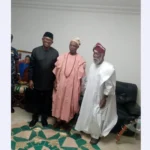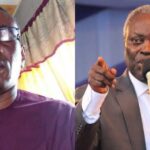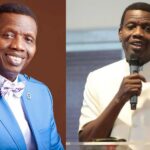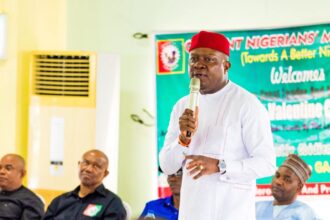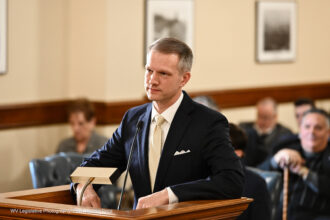There’s a moment, just before the doors of Comedy shows swing open, when the night holds its breath. Outside, Lagos hums with its usual chaos—honking cars, street vendors calling, the faint pulse of music drifting from open windows. Inside, the air is charged with anticipation, almost electric, as hundreds of guests gather, strangers yet united by a single expectation: laughter.
- The Architects of Laughter: Legends Behind the Stage
- 1. Basketmouth: The Master of Observational Chaos
- 2. AY: The Everyman Philosopher
- 3. Ali Baba: The Patriarch of Punchlines
- 4. Okey Bakassi: The Firebrand Social Commentator
- What Happens When the Curtains Rise
- Behind the Scenes: Production and Planning
- Safety, Comfort, and Social Norms
- What Guests Often Remember
- The Subtle Science of Timing
- Cultural Significance of Nigerian Comedy Shows
- The Anatomy of a Nigerian Comedy Show
- Closing Reflection: The Last Laugh
Walking into a comedy show headlined by Basketmouth, AY, Ali Baba, or Okey Bakassi is like stepping into a carefully orchestrated storm of humor. You cannot predict the exact punchline, the sudden improvisation, or the uncanny way a joke will pierce through the ordinary and touch something raw in your own experience.
The crowd is tense, alert, and ready—because these comedians are not merely entertainers; they are cultural cartographers, mapping society’s absurdities, contradictions, and truths with precision, wit, and audacity.
From the first flicker of stage lights to the last echoing laugh, the night becomes an immersive journey. Each performer brings a distinct signature: Basketmouth’s chaotic energy, AY’s reflective charm, Ali Baba’s narrative gravitas, Bakassi’s fearless social critique.
This article delves into what it truly means to attend a comedy show in Nigeria, where laughter is layered with history, social critique, and cultural reflection.
The Architects of Laughter: Legends Behind the Stage
To comprehend what a guest should expect, we must first unpack the personalities and histories of the comedians themselves. Each represents a distinct facet of Nigerian humor and cultural commentary.
1. Basketmouth: The Master of Observational Chaos

Bright Okpocha, known universally as Basketmouth, is a phenomenon whose brand of comedy thrives on the tension between chaos and precision. Since the early 2000s, Basketmouth has bridged stand-up comedy with celebrity culture, music, and socio-political commentary, creating shows that are immersive spectacles rather than mere joke sessions.
Guests entering a Basketmouth show can anticipate unpredictability: sudden celebrity cameos, live music interruptions, and a string of stories that oscillate between personal confessions and razor-sharp social critiques.
Basketmouth’s style often challenges the audience to confront their own realities. He’s known for turning everyday Nigerian frustrations—bureaucracy, relationship quirks, economic hardships—into shared laughter. The audience doesn’t just laugh at the jokes; they laugh at themselves, a subtle, almost therapeutic participation in societal reflection.
2. AY: The Everyman Philosopher
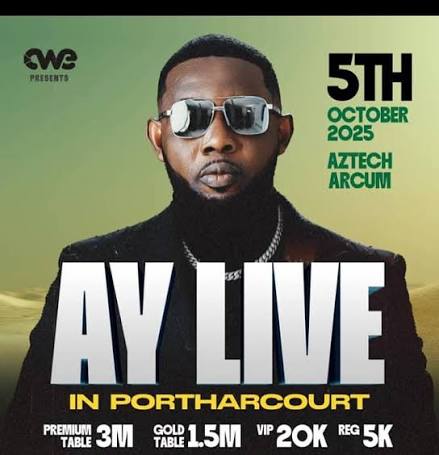
Ayo Makun, popularly known as AY, has built a reputation as the comedian who straddles humor and gentle wisdom. His shows are architectural in their pacing—opening with relatable stories of family, love, and corporate Nigeria, then building to climactic satirical sketches that lampoon societal absurdities.
Guests attending an AY show should expect a warm yet reflective experience. AY’s humor is inclusive: it nods to the middle class, the diaspora, and even the elite, without alienating any group. His ability to weave moral undertones into laughter makes his shows feel like communal therapy sessions where every punchline carries a subtle life lesson.
3. Ali Baba: The Patriarch of Punchlines

Ali Baba (Atunyota Alleluya Akpobome) is often referred to as the godfather of Nigerian stand-up comedy. With decades of experience, his shows carry an air of historical gravitas. Guests stepping into an Ali Baba performance are entering a lineage of comedy that spans Nigeria’s political, economic, and cultural transformations.
Unlike younger comedians who rely heavily on pop culture, Ali Baba’s humor is rooted in storytelling tradition, folklore, and philosophical observation. A typical show is layered, requiring the audience to engage mentally and emotionally. Guests can expect reflections on corruption, leadership, societal contradictions, and intergenerational conflicts, all delivered with impeccable timing and subtlety.
4. Okey Bakassi: The Firebrand Social Commentator
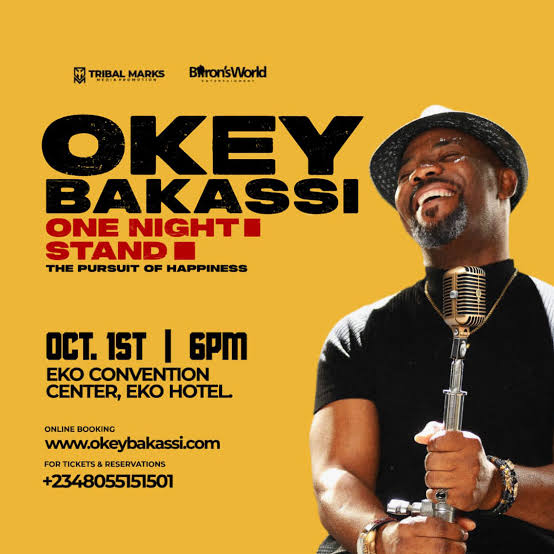
Okey Bakassi’s comedy is a mixture of street-savvy wit and fearless social critique. Often seen as the most politically charged among the four, Bakassi’s shows are high-energy, unafraid to tackle uncomfortable truths.
Guests can expect a confrontational but humorous lens on Nigeria’s politics, economic disparity, and social idiosyncrasies. His performances often involve audience interaction, encouraging viewers to vocalize opinions while he punctures misconceptions with comedic precision.
What Happens When the Curtains Rise
While the individual styles differ, a common thread runs through all major Nigerian comedy shows: engagement. These are not passive experiences. Guests are active participants in a cultural performance that mirrors their society, amplifies their anxieties, and celebrates their absurdities.
I) Pre-Show Atmosphere
The night begins long before the comedian steps on stage. Guests often arrive to buzzing venues, with vendors outside selling popcorn, drinks, and local snacks. The crowd’s demographics vary: young professionals, university students, celebrities, journalists, and expatriates converge, creating a microcosm of Nigerian society. The pre-show energy is charged with anticipation, whispers of who will bomb, who will shine, and which jokes might push boundaries.
II) Stagecraft and Flow
When the show starts, lighting, sound, and music synchronize with the comedian’s persona. Basketmouth’s shows, for instance, often feature live musical interludes, while Ali Baba’s are stripped down, spotlighting narrative delivery. AY and Okey Bakassi blend elements, alternating between storytelling, punchlines, and audience engagement. Guests quickly learn to navigate this rhythm: laughter, applause, gasps, and thoughtful silence all have their place.
III) The Audience’s Role
For these comedians, the audience is not merely an observer but a collaborator. Laughter, groans, and spontaneous reactions guide the performance. Guests may find themselves part of impromptu sketches, called on to answer questions, or referenced in anecdotes. This dynamic creates a sense of shared ownership of the humor: what happens on stage is inseparable from the reactions in the crowd.
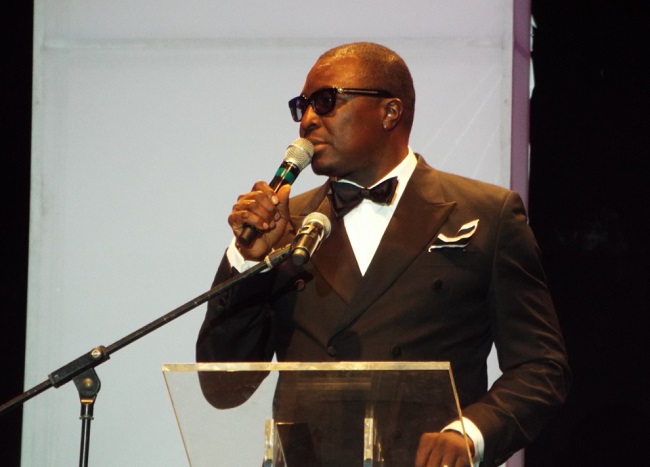
Behind the Scenes: Production and Planning
What guests rarely see is the meticulous planning behind these shows. Basketmouth often spends months coordinating live music, celebrity appearances, and set designs. AY’s shows involve rehearsal teams, script refinement, and audience testing. Ali Baba invests in cultural research and narrative coherence, while Bakassi ensures topical relevance and political acuity.
The backstage environment is electric. Comedians feed off crew energy, stage managers cue lights and sound, and makeup artists transform performers for the optimal stage presence. Guests may not witness this directly, but its impact resonates throughout the show, creating seamless, professional, and immersive experiences.
Safety, Comfort, and Social Norms
Attending a Nigerian comedy show is not merely a passive spectacle—it’s a navigation of social norms. Guests should anticipate:
- Crowded venues, particularly during peak seasons or national holidays.
- Active audience participation, sometimes requiring quick thinking.
- Subtle cultural codes—gestures, expressions, and reactions that carry meaning beyond the literal joke.
- Moments of controversy or provocative commentary, especially from Bakassi or Basketmouth, requiring guests to have a flexible sense of humor.
Despite the intensity, organizers often ensure security, clear pathways, and emergency measures, creating an environment that is exhilarating yet controlled.
What Guests Often Remember
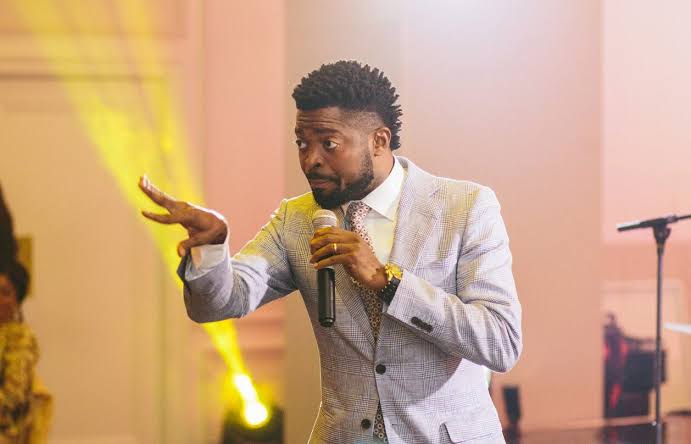
The brilliance of these shows lies not just in jokes but in the memories they create. A first-time guest might recall:
- The thrill of hearing a celebrity roast in real-time.
- The collective gasp and laughter when a social taboo is humorously addressed.
- Moments of personal recognition—when a joke resonates uncannily with their own life.
- The electric energy of thousands of voices united in laughter, sometimes spilling into impromptu sing-alongs or chants.
Veteran attendees often come for the experience, knowing each show is slightly different but fundamentally transformative. The humor is fluid, responding to current events, audience mood, and cultural shifts
The Subtle Science of Timing
One of the defining characteristics of these comedians is impeccable timing. Basketmouth’s rapid-fire jokes and occasional improvisation require the audience to remain alert. AY’s narrative arcs build slowly, teasing laughter until the precise moment. Ali Baba’s pauses are strategic, inviting reflection, while Bakassi’s cadence is punctuated by emphatic gestures that command attention. Guests quickly realize that timing in Nigerian comedy is an art form: too fast, and nuance is lost; too slow, and engagement wanes.
Cultural Significance of Nigerian Comedy Shows
These events are more than entertainment; they are cultural institutions. They:
- Reflect the Nigerian socio-political climate.
- Serve as platforms for emerging comedians and artists.
- Preserve oral storytelling traditions within a modern, urban context.
- Provide communal spaces where laughter becomes a unifying force across ethnic, socio-economic, and generational divides.
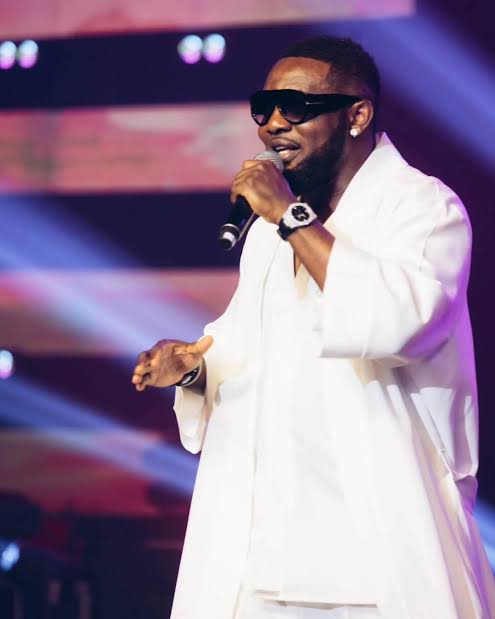
For guests, this adds an almost anthropological layer to the experience—they are witnesses to a living, evolving cultural practice.
The Anatomy of a Nigerian Comedy Show
1. Observational Humor
All four comedians excel at turning ordinary scenarios into comedic gold. Basketmouth might riff on airport experiences, AY on the chaos of Lagos traffic, Ali Baba on generational misunderstandings, and Okey Bakassi on political rhetoric. The common thread is relatability. Guests find themselves laughing at moments that mirror their own lives.
2. Socio-Political Satire
Political humor is woven seamlessly into Nigerian comedy. Bakassi thrives here, directly addressing policies and politicians, often testing the boundaries of what is acceptable in a live audience. Ali Baba’s satire is subtler, layered in allegory, challenging the audience to decode the critique. Even AY and Basketmouth occasionally inject political commentary, ensuring the crowd leaves both amused and contemplative.
3. Celebrity and Cultural Commentary
Basketmouth frequently parodies celebrities, while AY reflects on pop culture phenomena, and Okey Bakassi mocks societal hypocrisies. Guests witness a performance that is as much about Nigerian identity and its contradictions as it is about comedy itself.
4. Storytelling and Emotional Resonance
Ali Baba, in particular, structures shows around long-form storytelling. These are not mere jokes; they are narratives with arcs, climaxes, and denouements. Guests experience emotional journeys—sometimes laugh-cry moments—before the punchline lands. This depth sets Nigerian comedy apart from mere slapstick or gag-based humor.
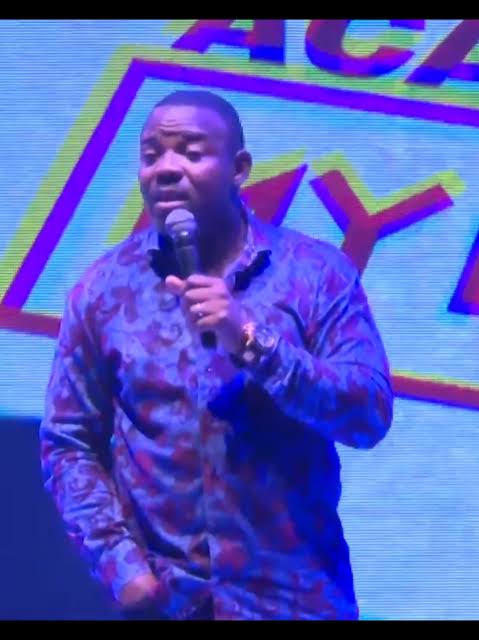
Closing Reflection: The Last Laugh
As the final act exits the stage and lights dim, guests often leave with more than amusement. They carry reflections on society, glimpses into personal truths, and memories of communal joy. Basketmouth, AY, Ali Baba, and Okey Bakassi do not merely perform—they curate experiences that challenge, entertain, and resonate.
For any guest, stepping into their world is a journey into the heart of Nigerian laughter: sharp, insightful, sometimes uncomfortable, but always unforgettable.
And as the city hums outside and the echoes of laughter fade into the night, one thing is clear: these comedy shows are a mirror, a celebration, and a gentle confrontation with the absurdity and brilliance of life itself.


